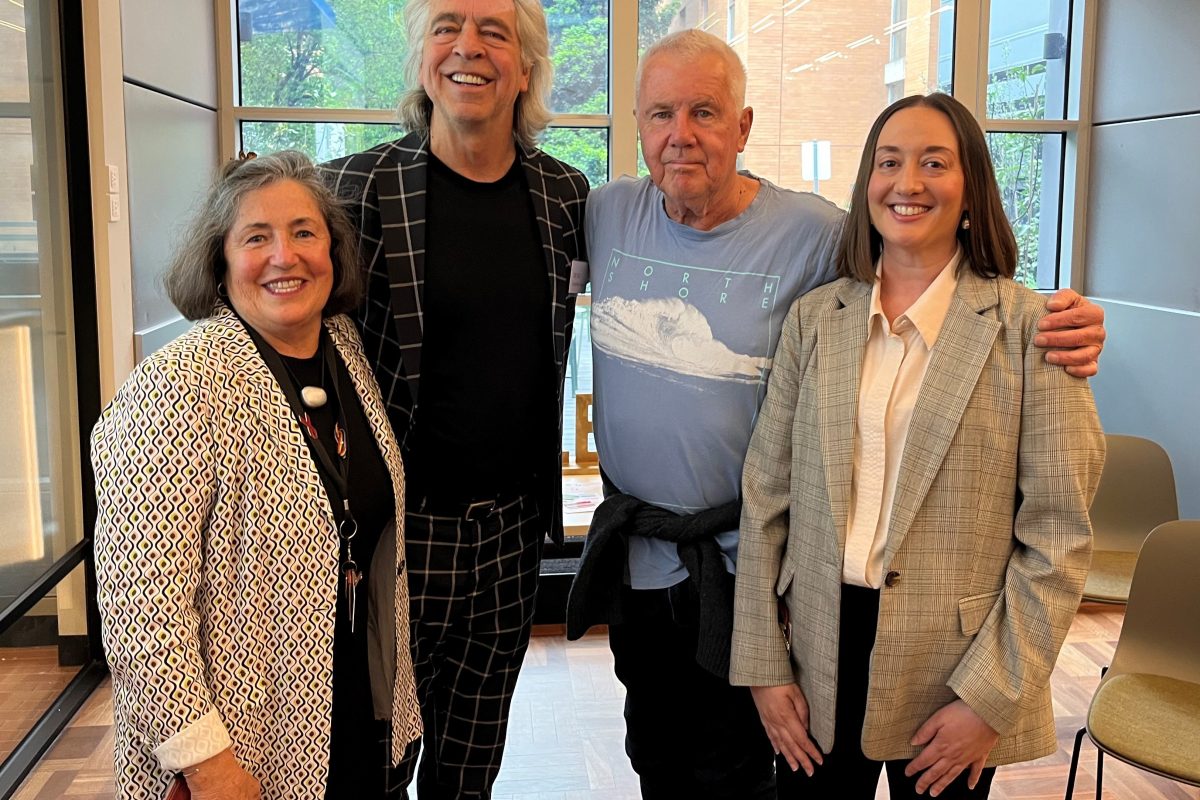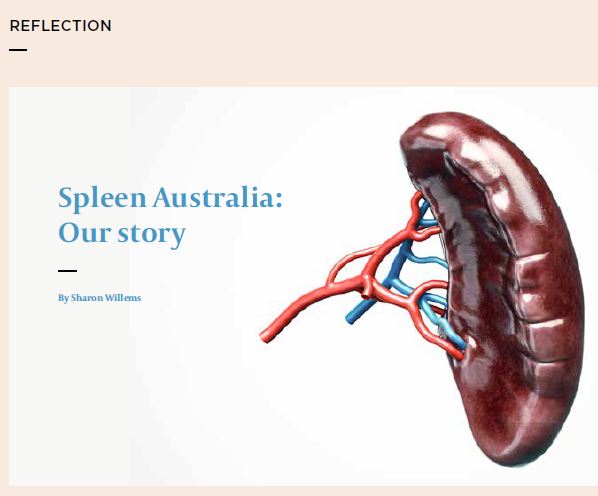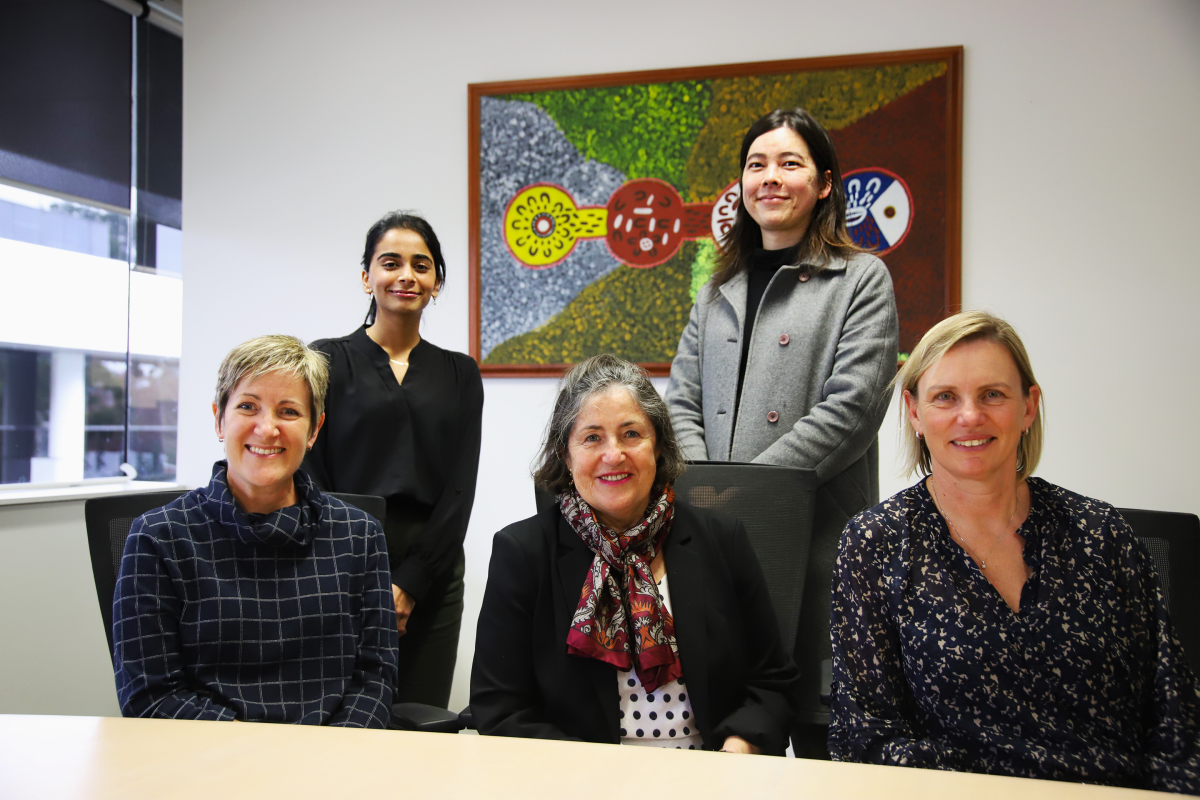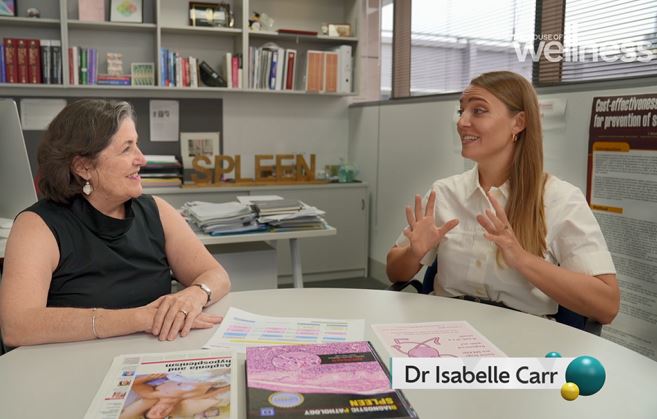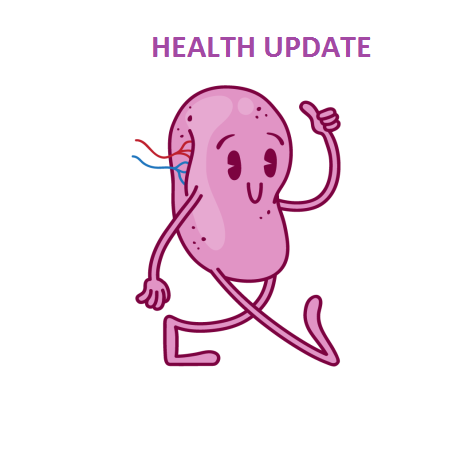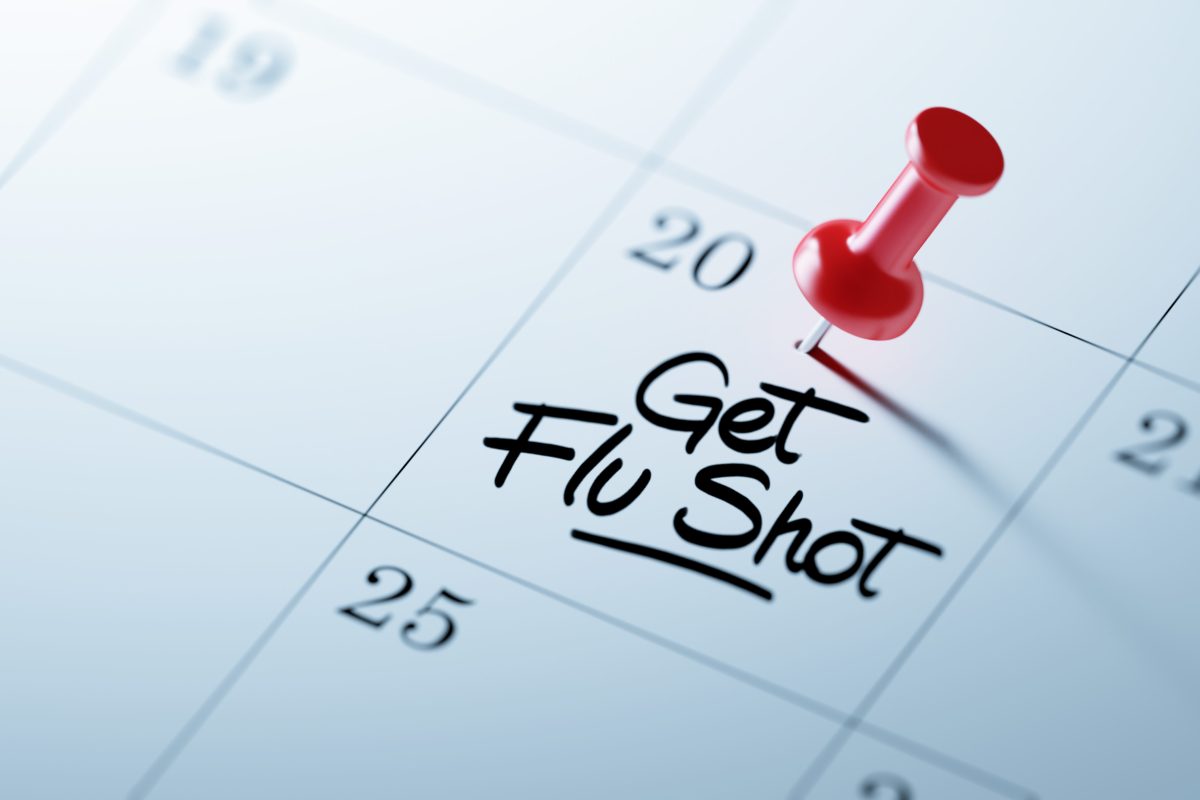Spleen Australia celebrates 20 years
Spleen Australia recognised two decades of work today with Daryl Braithwaite and Brian Nankervis coming along to The Alfred to help mark the occasion.
Speaking at the event, Department of Infectious Diseases Director Anton Peleg acknowledged the success of the clinical service.
“Thank you to everyone who has been a part of Spleen Australia. It’s growing every year, and there is still so much left to do,” said Anton.
Infectious Diseases Unit Deputy director Denis Spelman, who helped establish the registry/clinical service, spoke about the journey of Spleen Australia.
“Spleen Australia has had an impact on so many people, not just those people without a functioning spleen,” said Denis.
Spleen Australia began in 2002 when a young woman at the Alfred Health died from pneumococcal sepsis. The ICU and medical team felt that if she and her parents knew how to detect and prevent sepsis this young woman would still be alive today.
“Part of the success has been detecting that there was a need and chasing the resources to build something like this,” said Denis.
“But we are not there yet – we want to be able to completely prevent sepsis in this particular group. “I want to say a heartfelt thanks – not just to the patient groups but to everyone who has been involved.”
COVID-19 Vaccine Information
All Australians over five years of age will be offered a COVID-19 vaccine. The vaccines are not ‘live’ which means they do not carry any active part of the virus. We believe it will be an important vaccine for our patients to have. Below we have provided links to resources from the Australian Government, Department of Health, and Medicine/Vaccine advisory boards. We will endeavour to update our website regularly to reflect the most up to date information. Your GP will be helpful in providing advice regarding the vaccine.
COVID-19 2023 booster dose recommendations
ATAGI has updated its recommendations for a second 2023 booster dose of the COVID-19 vaccine, the goal of the vaccine program remains the prevention of severe illness from COVID-19. The updated recommendations are:
A second 2023 COVID-19 vaccine dose, is recommended for all adults aged ≥75 years if 6 months have passed since their last dose.
A second 2023 dose can be considered for adults aged 65 -<75 years and for those with severe immunocompromise. Within these groups, the second 2023 dose would be of most benefit to those who have no known history of SARS-CoV-2 infection (therefore unlikely to have hybrid immunity), who are at greater risk of severe COVID-19 due to multiple complex comorbidities, or who reside in a residential aged care facility.
People who become eligible for 2023 doses should continue to receive these doses until updated advice becomes available in early 2024.
A person may be vaccinated earlier than the recommended 6-month interval in exceptional circumstances, such as before starting immunosuppressant therapy, before overseas travel or if someone cannot reschedule vaccination easily (such as in an outreach vaccination program).
Omicron XBB.1.5-based vaccines are preferred for both primary course and further doses. Adults may receive Comirnaty Omicron XBB.1.5 ≥12 years formulation (dark grey cap) and Spikevax Omicron XBB.1.5. Comirnaty bivalent Original/Omicron BA.4/5, Spikevax bivalent Original/Omicron BA.4/5, Comirnaty bivalent Original/Omicron BA.1 and Nuvaxovid can also be used for primary or further doses but is not preferred.
To assess your eligibility please discuss with your GP or specialist. Click on this link for further information
Information resources
Australian Government Department of Health
The Melbourne Vaccine Education Centre (MVEC) have created a video explaining how the COVID-19 vaccines were developed quickly and safely.
The Therapeutic Goods Administration (TGA) provides information on the risk of clotting conditions in relation to COVID-19 vaccines.
The Australian Technical Advisory Group for Immunisations (ATAGI) provides information on the risk of clotting conditions in people with a history of clots, in relation to the COVID-19 vaccines.
Watch a video of Professor Michelle Giles, an Infectious Diseases physician and immunisation expert, discussing COVID-19 vaccinations and fertility.
COVID-19 FAQs
Am I at greater risk of getting the coronavirus infection?
There is now some information from the UK and elsewhere saying that people without a functioning spleen may have a slightly increased risk of getting COVID-19. The reason why you had your spleen removed and any ongoing medical treatments would add to this risk. Additionally, if you get a viral infection you may get a secondary bacterial infection (e.g. pneumonia).
All patients registered with Spleen Australia are recommended to have COVID vaccines (any type), as per ATAGI guidelines, to provide effective protection from the virus.
Who should I contact if I have symptoms and/or have COVID?
If you have any symptoms of COVID-19, immediately get tested (PCR or RAT) and isolate until you get your result. If your symptoms are of concern, contact your GP. If you have serious symptoms such as difficulty breathing, call 000 for urgent medical help.
When should I take my emergency supply of antibiotics?
Do not take your emergency antibiotics if you have symptoms of a viral infection. Get your symptoms assessed ASAP by your GP (eg. telehealth appointment) to determine if your symptoms are COVID related or a bacterial infection (or both). If the doctor feels your symptoms are due to a bacterial infection you will probably be prescribed a course of antibiotics. If you cannot get to see a doctor promptly (within a few hours) and feel very unwell, take your emergency supply of antibiotics. When you do get to see a doctor tell them what you have taken.
Last updated 27/11/2023
Spleen Australia: Our Story
Sharon Willems, our very talented nurse co-ordinator, has recently had an article published in the July 2023 issue of the Australian Nursing and Midwifery Journal (ANMJ).
The article describes the history of Spleen Australia, and states why this clinical service is so essential for our vulnerable patient population. These patients have a lifelong increased risk of serious bacterial infections. Left untreated these bacterial infections can lead to sepsis.
Click to read our story
Last updated 13/07/2023
Spleen Australia welcomes Western Australia
L to R: Dr Clare Huppatz; Sanchita Gera; Penny Jones; Sam Gibbings; Sharon O’Brien
Penny Jones and Sharon O’Brien in June 2023 travelled to Western Australia to introduce Spleen Australia’s clinical service to WA health professionals and patients. Penny and Sharon presented at the Communicable Diseases & Immunisation Conference (CDIC). They gave numerous presentations to clinicians at a variety of WA hospitals.
Spleen Australia is looking forward to working with WA patients. To register please click on the registration button on our website’s main menu bar.
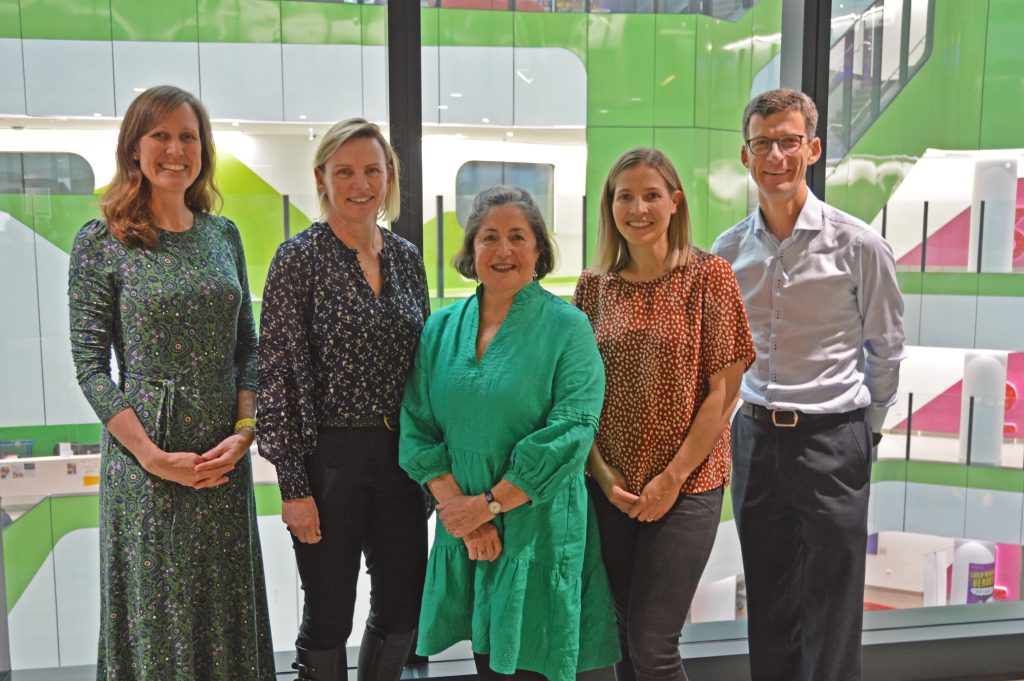
L to R: Associate Professor Asha Bowen; Sharon O’Brien (Spleen Australia Nurse Co-ordinator); Penny Jones (Spleen Australia Manager); Dr Hannah Gooding and Dr Christopher Blyth
Last updated 13/07/2023
House of Wellness – Spleen Australia
Penelope Jones, manager of Spleen Australia, has been featured in a channel 7+ episode of The House of Wellness.
The episode explains the importance of the spleen in fighting bacterial infections. Penny and her nursing team are committed to reducing the risk of life-threatening infections in people without a functioning spleen. The clinical service/registry is based in the Department of Infectious Diseases, Alfred Hospital in Melbourne.
Click to watch this episode
Last updated 13/07/2023
Annual Influenza Vaccine Information
It’s time to get your yearly Influenza vaccine (Flu shot).
In 2022, there was a resurgence of influenza virus circulation arising from the reopening of international borders. In 2023, seasonal influenza activity is expected to continue and the importance of influenza vaccination should be emphasised.
Spleen Australia and ATAGI recommend the yearly influenza vaccine for individuals with immunocompromising conditions and are FREE for all people living without a functioning spleen. Annual vaccination should ideally occur before the onset of each influenza season. The period of peak influenza circulation is typically June to September in most parts of Australia. Please click on the link for the full ATAGI statement.
The Influenza vaccine can be given at the same time as COVID-19 and other Spleen vaccines. Please check with your GP to see if you are due for any ‘spleen vaccines’.
For other great resources that answers many important questions about the Influenza vaccine, see the information resourses below.
Information resources
Australian Government Department of Health
Australian Technical Advisory Group on Immunisations (ATAGI) Clinical Advice March 2023
The National Centre for Immunisation Research and Surveillance provides information on the most frequently asked questions on the Influenza vaccine.
The Melbourne Vaccine Education Centre (MVEC) influenza vaccine recommendations
Last updated 05/04/2023
Meningococcal B Vaccine Information
NEW ADVICE: Spleen Australia and the National Immunisation Program (NIP) recommends a booster dose of the meningococcal B (Bexero) vaccine. The recommendation is to have this vaccine 5 years after your initial TWO doses.
The meningococcal B vaccine is FREE for all people without a functioning spleen. Below we have provided a link to resources from the Australian Government, Department of Health. We will endeavor to update our website regularly to reflect the most up to date information. Your GP will be helpful in providing advice regarding the vaccine.
Information resources
Australian Government Department of Health
Last updated 08/02/2023
COVID-19 Research
COVID vaccine research — Professor Sharon Lewin
Are you going to get your first, second or ‘booster’ COVID-19 vaccine? We are looking for a wide selection of Victorians to contribute samples to the Victorian COVID-19 Vaccinees Collection (VC²).
This important study (VC2) is open to all Victorians planning to receive a COVID-19 vaccine. Family and friends welcome to participate too.
It involves having blood and saliva samples PRIOR to any COVID vaccine dose and up to four times after. One of the best things about this study is that you can enrol online via the Doherty website. There will be no study visits to a hospital or clinic. The blood sample kits will be posted to you so that you can attend your local Melbourne Pathology service.
The samples collected will support research into the long term effects of COVID-19 vaccines, including what type of immune response is generated, how long immunity lasts and the impact of different viral variants.
To view study flyer click this link
For more information click this link – or call Jenny Tran on 0422 203 031
Last updated 08/06/2022
Health Update #2
Click this link to read our latest Health Update dated October 2021. This contains important information on COVID-19 and other health tips.

